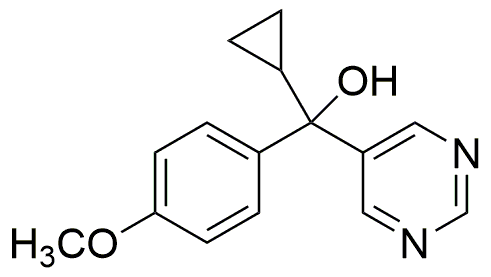Ancymidol is widely utilized in research focused on
- Agriculture: It serves as a plant growth regulator, effectively controlling the growth of ornamental plants and turf grasses. This helps in maintaining desired plant height and improving aesthetic appeal.
- Horticulture: Used to enhance flowering and fruiting in various crops, Ancymidol promotes better yield and quality, making it valuable for commercial growers.
- Research Laboratories: In scientific studies, it is employed to investigate plant responses to growth regulators, aiding researchers in understanding plant biology and development.
- Environmental Science: Ancymidol is utilized in studies assessing the impact of growth regulators on ecosystems, helping to evaluate their effects on non-target species and overall biodiversity.
- Greenhouse Management: It is applied in controlled environments to optimize plant growth conditions, allowing for more efficient use of resources and improved crop management practices.
General Information
Properties
Safety and Regulations
Applications
Ancymidol is widely utilized in research focused on
- Agriculture: It serves as a plant growth regulator, effectively controlling the growth of ornamental plants and turf grasses. This helps in maintaining desired plant height and improving aesthetic appeal.
- Horticulture: Used to enhance flowering and fruiting in various crops, Ancymidol promotes better yield and quality, making it valuable for commercial growers.
- Research Laboratories: In scientific studies, it is employed to investigate plant responses to growth regulators, aiding researchers in understanding plant biology and development.
- Environmental Science: Ancymidol is utilized in studies assessing the impact of growth regulators on ecosystems, helping to evaluate their effects on non-target species and overall biodiversity.
- Greenhouse Management: It is applied in controlled environments to optimize plant growth conditions, allowing for more efficient use of resources and improved crop management practices.
Documents
Safety Data Sheets (SDS)
The SDS provides comprehensive safety information on handling, storage, and disposal of the product.
Product Specification (PS)
The PS provides a comprehensive breakdown of the product’s properties, including chemical composition, physical state, purity, and storage requirements. It also details acceptable quality ranges and the product's intended applications.
Certificates of Analysis (COA)
Search for Certificates of Analysis (COA) by entering the products Lot Number. Lot and Batch Numbers can be found on a product’s label following the words ‘Lot’ or ‘Batch’.
Numéro de catalogue
Numéro de lot/série
Certificates Of Origin (COO)
This COO confirms the country where the product was manufactured, and also details the materials and components used in it and whether it is derived from natural, synthetic, or other specific sources. This certificate may be required for customs, trade, and regulatory compliance.
Numéro de catalogue
Numéro de lot/série
Safety Data Sheets (SDS)
The SDS provides comprehensive safety information on handling, storage, and disposal of the product.
DownloadProduct Specification (PS)
The PS provides a comprehensive breakdown of the product’s properties, including chemical composition, physical state, purity, and storage requirements. It also details acceptable quality ranges and the product's intended applications.
DownloadCertificates of Analysis (COA)
Search for Certificates of Analysis (COA) by entering the products Lot Number. Lot and Batch Numbers can be found on a product’s label following the words ‘Lot’ or ‘Batch’.
Numéro de catalogue
Numéro de lot/série
Certificates Of Origin (COO)
This COO confirms the country where the product was manufactured, and also details the materials and components used in it and whether it is derived from natural, synthetic, or other specific sources. This certificate may be required for customs, trade, and regulatory compliance.


